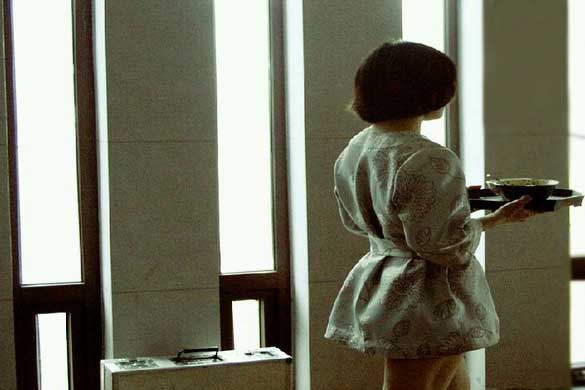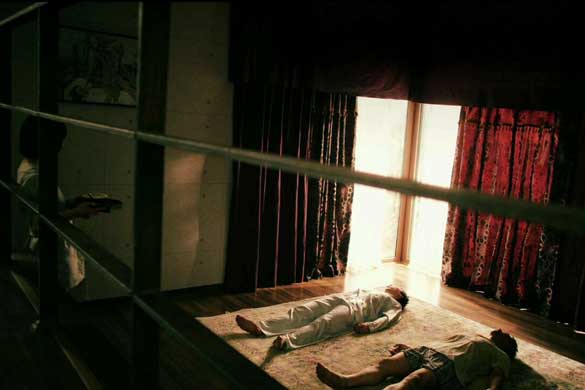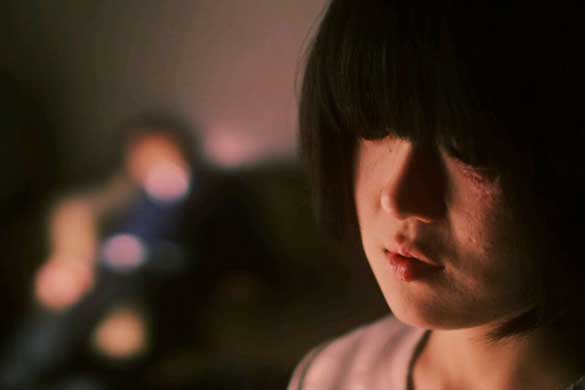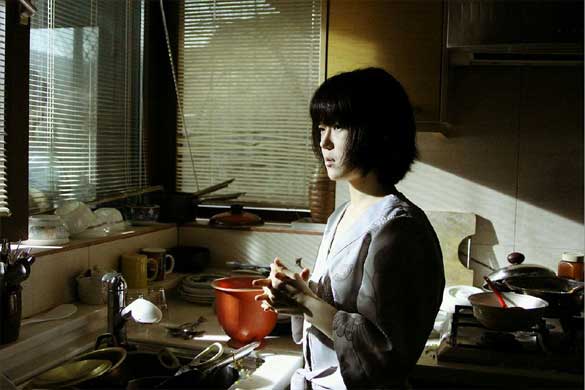"This guy, he married my mother when I was young and I kind of liked him, but then the old f*ck started to put a strange thing in my mouth.
It tasted weird with an odd smell and it was hard to breathe... So, I took a bite..."
Synopsis:
An unnamed young woman stands in a kitchen cluttered with unwashed dishes, grinding blue pills in a mortar and pestle. Sprinkling the powdered results onto two bowls of food on a tray, she carries the 'meals' down a long corridor - the walls of which are covered with family pictures from her youth - pausing briefly to look at her now scarred face in a mirror.
On arriving in the living area of what we quickly realise is her home, she begins a one-sided conversation with both herself and two paralysed but conscious men lying helpless on the floor (one of advancing years; the other much younger, but both looking much the worse for wear) and as she roughly feeds the elder of the two, virtually throwing the food at his mouth, she suddenly realises that she has yet to introduce them to each other.
And so, a detailing of the violent, abusive actions that led the men to their current predicament gets underway but before these 'prisoners' have even a chance to perhaps consider the error of their ways, their true physical and psychological 'payment in kind' torture begins...
Review:
Revenge has long been a major staple of Korean film narratives, having not only been noticeably prevalent for almost as long as references to violence itself but also through the years having served as both its cause and effect. Within the plethora of male-centric 'mano a mano' tales of violent retribution - from 'Oldboy' to 'The Chaser' to 'I Saw the Devil', and all points in between - detailing revenge as a payment in kind of sorts for male brutality, abuse, torture and/or murder of (as often as not, helpless and largely innocent female) characters, there have been regular examples too of women exacting feminine vengeance against specific males, in context, and by extrapolation against the male species as a whole.
However, though the repeated appearance of these stories of female retribution over the years without question speaks of the gradual shift in place of women in Korean society and the slow, often difficult, move towards balance of the sexes as opposed to traditional patriarchy (and by the same token in each slightly different case serving to underline the gradual change in depictions of female characters in Korean cinema narratives, in the process), it can hardly be denied that - contrary to the majority of stories of male-oriented retribution - in numerous cases female characters taking revenge undertake their vicious quest only after having lost semblance of rationale allowing them to ignore any question of moral right to concentrate on whatever action they feel is warranted (necessary) to exact justice for the wrong they and/or their loved ones suffered.
Of course, this isn't always the case (take 'Sympathy for Lady Vengeance' as a contrasting example of a woman who clicks instantly back into normality once her vengeance is successfully concluded) but thrillers such as 'The Housemaid' (1960); 'Diary of June'; 'Princess Aurora'; 'Bedevilled'; 'Azooma' (and the list goes on) or even the endless horror stories of vengeful female ghosts (too many to mention); etc. etc. stand as pointers to the numerous cinematic instances in which the terrible events female characters are subjected to cause an implied yet unmistakable mental trauma and twist leading directly and consequently to utter fanatical obsession with bloody retribution at any and all cost.
Don't get me wrong, that isn't a criticism on my part, rather it's just a statement of 'it is what it is', and ultimately the fact of this thematic prevalence remains regardless of whether you choose to see its continuing appearance as largely a deeply set, repeated - yet often veiled - reiterating of classic Korean Cinema depictions of feminine individuality from as far back as the Golden Age (female outspokenness and indeed sexuality as a destabilising thorn in the side of traditional patriarchal ideals); cite it as part of the gradual shift towards stronger female characters in Korean cinema as a whole, as has been seen in various genres in the last few years; or treat it as simply an eminently useful narrative trope adding background and context to violence.
 |
With 'An Atrocity' being a short film having a duration of only ten minutes, the above histrionics/dissection (call it what you will) may at this point appear as rather overkill but in spite of its diminutive size this short not only successfully stands as equal to most of the recent examples of all of the above but also has as much (and perhaps even more) to say on the subject of female revenge exacted on males as any of the aforementioned examples.
'An Atrocity' begins with opening credits consisting of white text on a wholly black screen accompanied by a loud, repetitive crunching sound and as the first scene in the kitchen take over the visuals we see that the audio is our twisted heroine using her mortar and pestle to crush the blue pills to powder. On first view, the specific tablets used seem of little note and largely appear as just some medication or other to keep the girl's prisoners conscious but immobile. However, in hindsight considering the sexual nature of the torture she is soon to subject the men to (as well as that which she was put through herself as a minor) and the importance to her retribution of them both being able to become physically aroused in spite of being virtually paralysed - in the case of one of the men, of elderly years too - I would tend to edge towards the idea that the noticeable blue colour (and indeed oval/diamond shape) of the pills is a deliberate implication of erectile dysfunction medication used to force the men to states of erection. Though that is purely conjecture on my part, if it is indeed the case it underlines an absolutely perfect pre-chosen 'eye for an eye' aspect to proceedings, from the very outset.
Being of such a short running time (I know, I know, I've mentioned that already... and I'm likely to do so again before this review is done and dusted), there is, of course, no time to include the almost requisite Korean cinema back-story flashbacks, resulting in 'An Atrocity' needing to use a good deal of the female's dialogue as exposition, but while in most instances I would find that less than ideal, to say the least, here it works like a charm; the female character's one-sided conversation (hers is the only dialogue in the entire film) accentuating her mental state/imbalance, throughout.
Not only that, but her mental twistedness is shown to stem wholly from the abuse that she was subjected to at the hands of men's violent whims ("You told me that's what had made me ill but I was sure I was fine, so you helped me by spreading my legs", she says shortly before throwing up on one of the men) and in the interim her deeply warped perspective has clearly become perfectly normal from her point of view leading directly to her now unshakeable belief that it's her absolute right to do unto others as they did unto her.. and that brings me to possibly the most important thematic statement 'An Atrocity' has to make:
 |
On more than one occasion as the narrative unfolds, this vengeful girl makes the same comment - "I told you not to come" - and though the word 'come' is spelt slightly differently in each context (if you get my meaning), its implication is the same, albeit in a fictitiously violent setting: Women in a historically patriarchal society whose wishes have long been ignored by men assuming they had the right to do as they pleased without consequence simply because they are male, and a gradual changing balance of power with females now finally fully prepared to take a stand against misogyny, as free-thinking individuals in their own right - that forthright attitude coming as an inevitable, eventual and direct reaction to the very patriarchy that tried to keep women in "their place".
Though this idea is pretty self-apparent within the main story itself it is reiterated front and centre at the conclusion of 'An Atrocity': Looking one of her male captives in the eye after making him watch her have sex, our vengeful female character states "You b*stards always think you can f*ck whoever you want, whenever you want. Why can't I do the same?" and, to my mind, that statement sums up the main theme of 'An Atrocity' to a tee.
I've already stated my belief that 'An Atrocity' easily stands alongside the majority of feature length female vengeance narratives but considering what to my mind is, of late, a somewhat stepping back in cinematic offerings to male-directed storylines with overly (and/or overtly) misogynistic undertones - 'Mizo'; 'The Suffered', to name but two - the facts that A): 'An Atrocity' is written and directed by a lady, Jang Sun-hee, and B): it could be seen as almost these recent films' antithesis, all add up to it feeling not only fresh but also much needed by Korean cinema as a whole.
Ultimately, the film's title too says it all: Is the atrocity of the title in reference to the actions of this vengeful female; to the male abuse that twisted her to the point of taking revenge; or to all of the above; and ultimately what is more atrocious, the cause of an atrocity or its effect?
As a final note, I should point out that for the duration of the narrative 'An Atrocity' features no music whatsoever (the only musical track accompanying the closing credits; a darkly playful piece featuring deep oboe, mid-range synth, high-end strings and a deliberately jarring, off-kilter beat) but though that fact might cause many of those reading this to raise an eyebrow, director Jang Sun-hee deftly makes use of actual sounds from scenes as almost the film's percussive heart; each adding to all-encompassing dialogue and increasingly close proximity visuals (gradually shifting from fixed position mid-distance framing to intimate, to the point of intrusion, handheld camerawork as the violent retribution begins in earnest) to ensure that a musical soundtrack is never needed nor indeed ever missed. In fact, that decision (be it as a result of budget constraints or not) serves to increase the overall realism present and add greatly to the film's overall strength, as a direct result.
 |
Summary:
Despite its short running time, 'An Atrocity' not only succeeds in easily standing alongside the majority of feature length Korean thrillers detailing feminine vengeance and revenge but also by means of its female directed perspective serves as a much needed antithesis to recent male-created (and some would say misogynistic) cinematic offerings, while being portrayed in an equally brutal fashion. Certainly, 'An Atrocity' is as unforgiving as any of its male-directed, male-centred contemporaries but to my mind that really is only fair.
'An Atrocity' (잔학기) / 2013 / directed by Jang Sun-hee
|





